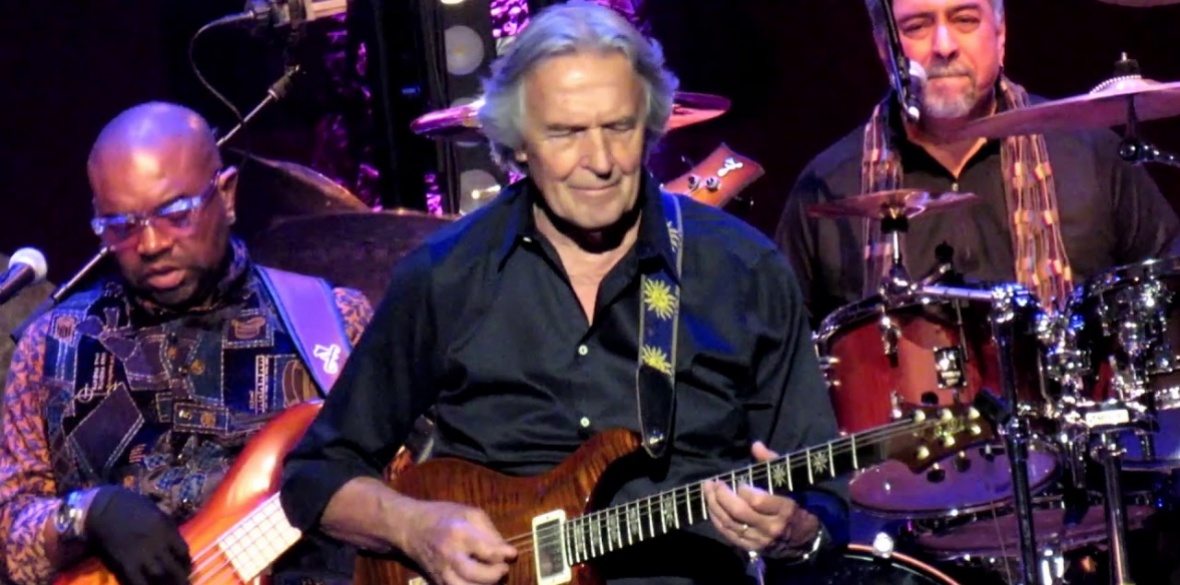This is the last article you can read this month
You can read more article this month
You can read more articles this month
Sorry your limit is up for this month
Reset on:
Please help support the Morning Star by subscribing here
JOHN MCLAUGHLIN is one of the great pioneering jazz guitarists whose work defies any neat genre categorisation.
Born near Doncaster in 1942, he took up the guitar aged 11 and went on to play the blues with Alexis Korner, Graham Bond and Ginger Baker before moving to London and making his first classic album Extrapolations in 1969 with drummer Tony Oxley, saxophonist John Surman and bassist Brian Odges.
That same year he moved to New York to join the band Lifetime with the great drummer Tony Williams and played on several epochal Miles Davis albums, In a Silent Way, Bitches Brew and Jack Johnson.
Two years later, he formed the momentous Mahavishnu Orchestra and in 1975 Shakti, strongly influenced by Indian musicians.
A true musical internationalist, his work has always been a sonic amalgam of many cultures and he’s recently performed free concerts in Palestine and recorded the beautiful Gaza City, a composition of powerful commitment.
Now, at the age of 77, he says he has retired — but hopefully he may change his mind. He responds with a passionate lucidity to questions about some of the key episodes of his life in music, from his childhood onwards.
Born in South Yorkshire in the small village of Kirk Sandall, he spent the first seven years of his life there “and thoroughly enjoyed the open countryside. It marked me for ever.” His family moved to Northumberland, eventually ending up in Whitley Bay.
It was “great fortune” that his mother was an amateur but dedicated musician and music, mostly classical, was always on the radio or on the gramophone.
“Music was with me from the moment I was born,” he says. “This led to a profound musical experience when I was about five and probably determined my destiny at that moment. By the time I was eight I asked my mother to pay for piano lessons and she did.”
Aged 16 and “captured by jazz” he went on tour, finally ending up in London. “It’s the dream of every jazz musician to end up in the capital,” he says, “the possibilities are great. Of course life was precarious but at 18 it is simply an adventure. It took me quite some time to enter the London scene — I had to work diligently to be up to the London standard.”
The early 1970s saw an upsurge and rebellion in the US after he arrived there and that had an impact on his work. “My dedication to music was specifically to black American music and I followed the cultural and political events of black Americans, particularly the civil rights movement before Martin Luther King Jr’s arrival.
“The assassination of Medgar Evers and the Birmingham, Alabama, church bombing by the Ku Klux Klan had a powerful effect on me. Miles Davis had been beaten up by a white cop outside a club in 1959. All of these events and the musical reactions of black jazz musicians exposed me to the existence of white supremacy in the US.
“Musically it was a monumental experience. It was the culmination of my life’s dream and in many ways allowed me to grow exponentially as a musician. As a human being I became more intolerant of the white supremacist movement.
“Working with Tony Williams, Larry Young (Khalid Yasin) and Miles, I witnessed many examples of racial intolerance. While I was working in Harlem clubs with Tony, I witnessed racial intolerance towards me as a white man. I could really understand that and fortunately I was never physically abused.”
The musical cosmopolitanism that has been so crucial to his life began at the age of 11. Thanks to his elder brothers, he’d been exposed to Mississippi blues, flamenco music, Indian music and finally jazz.
They all had a deep impact on him as a listener and musician: “Indian music and its absolute inclusiveness of the human psyche and John Coltrane’s A Love Supreme inspired me to seek answers to the great questions of existence and the effect of that inspiration still directs my life. Ultimately, my love of all those musical cultures found their expression in my music years later.”
For me, McLaughlin’s music is the sound of living socialism but he is at pains to point out that he’s never had a message, political or otherwise. “My search has been for beauty and the search naturally ends up in the inner search for beauty,” he stresses.
“Beauty comes from beyond the mind and is always in the other. The experience of true beauty changed me and will change anyone for ever. My political opinion is that man has a dark side and it’s called stupidity.
“Unfortunately, many people love their dark side. In my opinion the only way we can make the world a better place is if we work on ourselves and make ourselves better human beings. Of course this means letting go of our stupidity.
“We must express our love and support for all people who are under the heel of either a dictator or the policy of apartheid, which is what exists in Palestine today, although they are not alone, unfortunately.”
Despite the fact that there are many wonderful, peaceful and caring human beings in the world, greed and stupidity are “dangerously prevalent” in many of its governments, he says.
“Unfortunately, things will get worse before they get better. People, especially men, need to realise that we really do live in a global village and if there are people living in a part of the village who are suffering, if we don’t take care of them, eventually the whole village will suffer the consequences of our lack of heart.”










